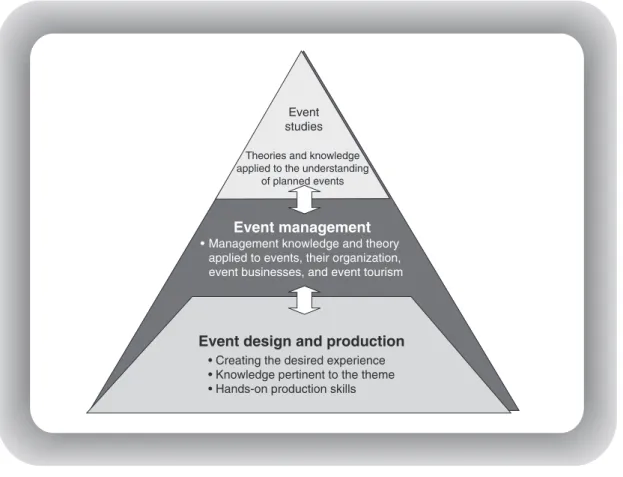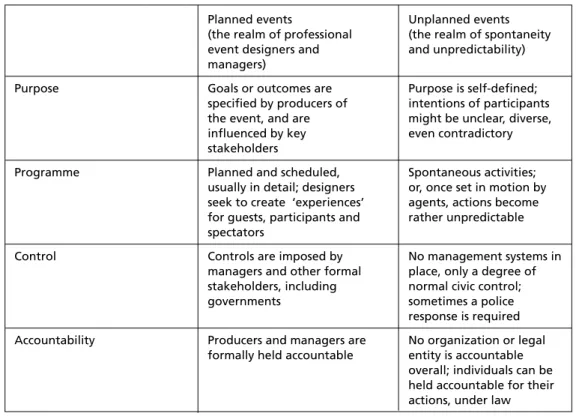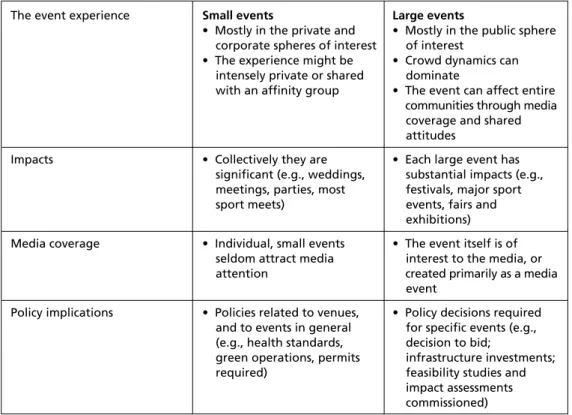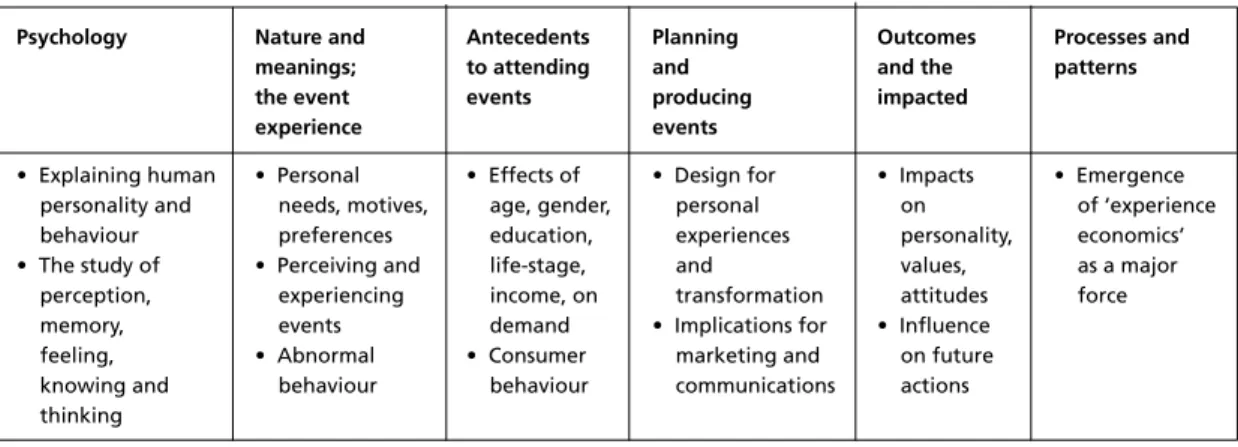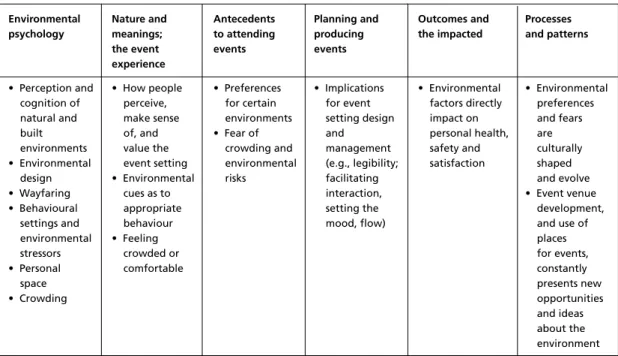Further reading is from the sources cited in the text, which will provide greater depth of understanding, or connect you to many event management and event tourism applications. The 'research agendas' provide very specific ideas, in addition to the mental exercises elsewhere in the book.
Introduction and Overview of Event
Learning Objectives
Event Studies is the academic field dedicated to the creation of knowledge and theory about planned events. Event Management is the applied field and professional practice that draws on knowledge and theory from Event Studies.
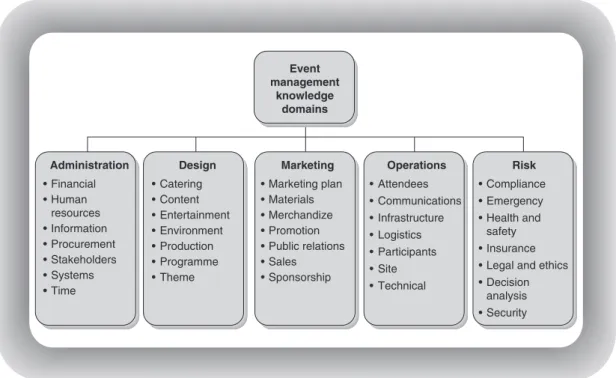
Event Production, Event Management, Event Studies
Event Studies can also exist without event management, and in fact it already does. There is also an interest in events in many other disciplines and related fields, and what they teach includes event studies, event management and sometimes design and production.
When Is a New Field of Study Born?
John Tribe argues that tourism is not a discipline, but a field of study that draws on a number of disciplines. Where a number of disciplines are used, we can say that the new field of study (like Event Studies today) is multi-disciplinary in nature.
The Need for Event Studies
By actually acknowledging the existence of Event Studies, it could free up research and publishing opportunities. Finally, more and more students will do further education, through research, related to the themes of event management and event studies.
The Gap Between Practitioners and Researchers/Theorists
I also believe that there will be a growing need for planners and policy analysts who must deal with complex issues related to events from many different perspectives (eg, social, cultural, economic, environmental) to which Case Studies provide a necessary foundation. Elsewhere, it is likely that closing this gap will require direct intervention by professional associations in seeking research and training partnerships with academic institutions that specialize in event management and event studies.
Discipline or Field of Study?
What defines a field of study is the 'core phenomenon', in our case the experience of the planned event and its meanings.
The Core Phenomenon: Event Experiences and Meanings
Events are also important, but are not at the core of closely related fields of study, and these are explored in more detail in Chapter 6. We can say that certain types of events are part of leisure studies, but the event itself is not central. core of leisure or recreation.
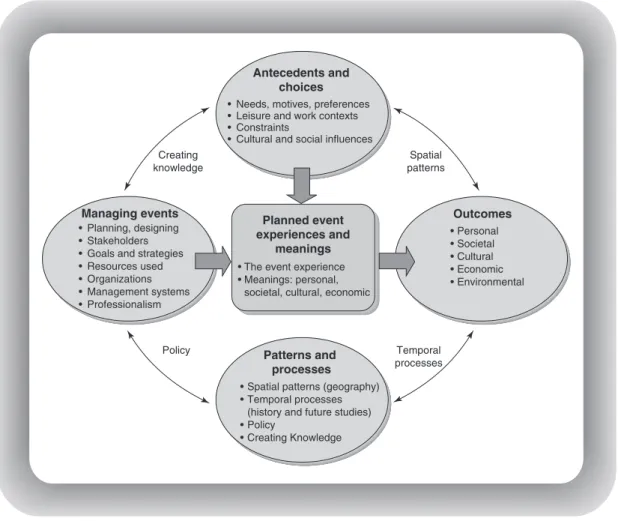
Theory on Experience and Meanings
However, what characterizes all art is the emphasis on aesthetics, a form of experience. Related to that conclusion is the claim that event planning and design cannot create experiences, but can only suggest, facilitate or limit them.
Antecedents and Choices
To understand event experiences we also need to look at communication, learning and interpretation theory (ie how do we motivate attendance, shape expectations and create the best learning environments). Identifying and taking care of the 'highly involved' is of particular interest to event designers and marketers.
Management of Events
Outcomes
Patterns and Processes
Chapter Summary
Study Questions
Further Reading
The World of Planned Events
This chapter begins with basic definitions of "event" and "planned events," including a discussion of the differences between planned and unplanned events and the issue of scale (small versus large events). This chapter concludes with a profile of each of the major types and key subtypes of planned events.
What is an Event?
Many adjectives are used in connection with the term 'event' and we need to understand how they arise by considering the form or function of planned events. Terms such as "hallmark", "mega" or "icon" refer to the function of events (eg, to create images and market places, their size and importance, and their unique appeal).
Time is of the Essence
On the one hand, a short, intense event experience may be just what is needed, but people are also willing to give up large blocks of time to travel to events. Is it possible that people value time differently and therefore the same event experience may be much more satisfying for some.
A Time and a Place
These values and attitudes are all shaped by our culture, and perhaps it would be healthier if our cultural perception of time changed. The value of time varies greatly between people, at different stages of their lives and between cultures.
Planned Events
Every event has a form that makes us call it a celebration, protest, riot, party or whatever. However, the programmed style elements are not always applicable to unplanned events because they are tools for event planners and designers.
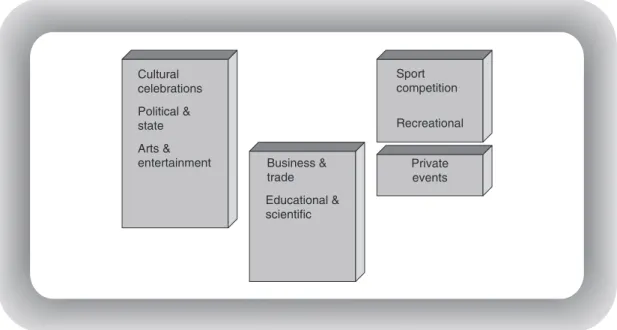
An Experiential Typology?
Functions of Planned Events
Once the goals have been clarified, perhaps prioritized, the actual work with event design can begin. But the designer can at least assume certain things about the form of the event as long as terms like festival, fair, tournament or conference are used – if all stakeholders agree that the event should be a party or festival, there is no absolute need for specific goals to start planning.
Hallmark and Iconic Events
Historically, festivals and fairs fulfilled important roles that were not discussed or planned, they simply happened because they were needed. Markets and fairs were necessary for trade, celebrations and celebrations fitted organically into everyday life, games were not professionalized as sports.
Premier or Prestige Events
For example, the FIFA World Cup or the Olympics are loaded with symbolic meaning, so many people want to participate because of what they represent, not where they are. And what they represent (ie their meanings) is of course of great interest in Event Studies.
Mega Event
Media Event
Cause-related Event
Corporate Event
Publicity Stunt
Special Event
There are two perspectives of 'specialness' to be considered: whether it is special for the organizers or for the participants and customers. For a customer or guest, a special event is an opportunity for an experience that goes beyond the usual choices or beyond the everyday experience.
Spectator and Interactive Events
A special event is a one-off or rarely occurring event outside the normal program or activists of the sponsoring or organizing body.
Participant Events
They wore their team's red colors, had a party, attracted media from all over North America, and were tolerated by the police and civil authorities. Planned events Unplanned events (sphere of professional (sphere of spontaneity of event designers and unpredictability) managers).
The Question of Scale
Incidentally, merchants and civic officials subsequently decided that they would not tolerate such spontaneous celebration in the future as it carries many risks. The core phenomenon is not changed by the variable scale of events, although this diversity makes Event Studies much more interesting and challenging.
Frequency
Even frequently attended events can be 'special' to the audience, depending on their expectations, mood and experiences. Activities within scheduled events are usually related to the theme (such as performing at a concert, competing in a competitive sporting event, or meeting at a conference).
Cultural Celebrations
Individual participants and guests at events engage in their own activities, often unscripted and personal (eg, talking, eating, bodily functions, singing along, cheering, watching, reflecting), and these also contribute to the overall event experience. In this sense, the activity of mountain climbing embodies specific events for the participants, but they are highly personal and not open to the public.
Festivals
Manning (1983: 4) saw festivals as a rich 'text', the reading of which provides much knowledge about local culture and community life. Festivalization' is a term used in reference to the strategic use of festivals rather than marketing and tourism promotion, as in the 'festivalization' of many historic cities (see, for example, Richards, 2006).
Carnival
Richards (1996) said that in the 1970s, festivals were recognized as catalysts for the development of the arts at the local level. Midsumma Carnival' in Melbourne, Australia is an example of the many gay and lesbian Mardi Gras or carnival events held around the world, many of which have become major tourist attractions (Pitts, 1999).
Heritage Commemoration
It is an opportunity to celebrate our achievements, which were born in the bold vision and shared values of our forefathers, and which are expressed in nearly every language of the world through the contributions of new Canadians. It is a time to rejoice in the discoveries of our scientific researchers, in the success of our entrepreneurs, and to remember our history – a history in which each new chapter turns out to be more moving, more fascinating than the last.
Parades and Processions
Canada Day is a time to celebrate the heritage passed down to us through the works of our writers, poets, artists and performers. Heritage commemorations have not received much specific attention from event scholars, so you have to look in the general anthropological and sociological literature, and in the growing number of studies in cultural and heritage tourism for research and discussion.
Religious Events
Political and State Events
Arts and Entertainment
Performing Arts
Temporary (i.e. visual art made with a limited life expectancy, or a one-off performance) versus permanent.
Literature
Visual Arts
Business and Trade Events
Meetings and Conventions
Conferences are assemblies for consultation and discussion that must be small enough to facilitate interaction. Trade shows are usually invitation-only based on specific business needs or association membership.
Fairs
According to CEIR, 'Participants rate trade shows as the number one most useful source of information with which to make a purchase decision.' Professionals attend trade shows to learn about new products and meet face-to-face with suppliers. Part of the increase in seats is attributed to a lack of space during the two peak exhibition seasons.
World’s Fair
Although North Americans associate the word "market" with a place to buy groceries, fairs were originally occasional markets. While carnivals were often associated with religious observances, and now mostly feature entertainment and entertainment, fairs are more about productivity and business than public themed celebrations.
Education and Scientific Events
Sport Events
This is a huge category considering the sheer number of sporting events taking place around the world all the time, not to mention the ever-increasing variety of sports and forms of sporting events. Sports events are also often discussed in books and research on sports tourism, including the book Sports Tourism by Turco et al.
Recreational Events
These authors argued (p. 8) that sporting events and other special events share commonalities, including their service orientation, incorporation of celebration and drama, media coverage, and similarities in organization and operation. Traditional sporting events such as the Olympics always incorporate ceremonies and festivals, and it has now become common to build a program of special events around a sporting event to create a festival or special event with increased appeal.
Private Events
Events at the Margin
Flash Mobs, Guerrilla Gigs, Pillow Fight Clubs and Santacons
Many of them will not meet our definition of 'special' as they are regularly planned and hardly unique, while others are on the fringes of being planned versus spontaneous. Their goal is to turn an ordinary public space into a pillow fight zone and a group of strangers into a community for the duration of the match.
Protest! Demonstrate! Riot!
Note also that the discussion of festivals in particular introduces important concepts, especially ritualistic behavior, that are important in cultural anthropology and are later used in our conceptualization of the "experience of a planned event." Explain how form, function, and experience can be used to classify events (ie, typologies) and problems associated with each approach.
Foundation Disciplines
Part One
The overview of planned events in the previous chapter has already introduced a number of disciplinary perspectives on Event Studies, particularly some of the sociological and anthropological dimensions of the study of celebrations and celebrations. The aim of the next three chapters is to make readers aware of the nature of the underlying disciplines, and especially to demonstrate their specific theoretical and methodological contributions to Event Studies.
Culture
High culture is associated with theatre, opera, ballet, the symphony, serious literature, art galleries and museums, all of which tend to be considered national assets and thereby attract government subsidies. There is more standardization of products and experiences in this realm of popular culture; most people relate to it on a daily basis without thinking that it represents 'their' culture.
Rites and Rituals
The usual time and place must be restored, as in closing ceremonies and formal, informal farewells. Entry must at least be demarcated and arranged in such a way that he first "arrives" at the right time and place, and only then is he allowed to enter the event.
Research Traditions and Methods
While the opening words of a meeting or convention may not have the cultural weight of a religious blessing (i.e. 'sacralization'), they perform a 'ritual of appreciation' that clearly states, 'we have begun' and this place, a few minutes ago empty, can now be enjoyed.
Ethnography
Contrary to tourism being a negative force, Xie concluded that the commodification of the ritual as a tourist-oriented cultural production had resulted in it becoming a self-perceived, authentic expression of the indigenous Li people's culture. Another important conclusion of this research was that training and empowering Li would enable them to more fully participate in and benefit from tourism.
Ethics
The dance is now seen internally by the Li people as a source of pride and identity. The sustainable development of ethnic tourism in Hainan requires the involvement of the Li to explain to visitors the history of the bamboo dance and its symbolism, and uses the performances to more clearly display the Li identity.”
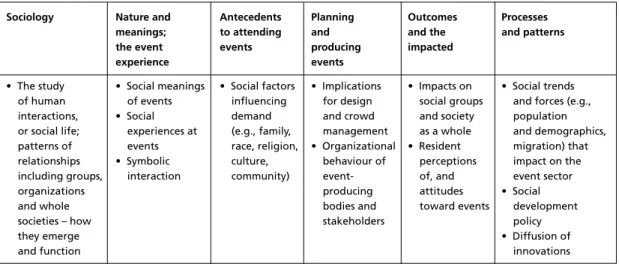
Critical Social Theory
Functionalism
Symbolic Interactionists
Social Capital Theory
Social Network Theory
Diffusion of Innovation Theory
In the events sector, we can observe innovation and diffusion in terms of new types of events and how they spread globally, usually through the influence of mass media. Innovation and diffusion are not necessarily good or bad, but understanding how they work is important in terms of strategy and marketing.
Contributions of Sociology to Event Studies
Sport Sociology
Environmental Sociology
Events and Urban Sociology
Events and Rural Sociology
There are also divisions in psychology, especially 'humanistic psychology', represented by the works of Maslow, which takes a phenomenological approach that is in direct opposition to the scientific or positivist paradigm that dominates. In this section we examine two mainstream branches, 'cognitive psychology' and the psychology of personality, and then turn to two mixed subdisciplines of particular relevance to Event Studies: Environmental and Social Psychology (Figure 3.3).
Cognitive Psychology
There are many subfields and specialized applications, such as you will encounter in education and interpreting ('learning psychology') and 'industrial psychology'. Thinking: The higher order mental processes we usually call thinking include "reasoning" (making sense of things), "creativity" (or imagination, innovation), "judgment". such as determining right from wrong, dangerous from non-risky) and "problem solving" (ie solving a puzzle, figuring out how to navigate a space).
Personality
Agreeableness: Traits associated with this factor include trust, straightforwardness, and altruism, and it is contrasted with hostility, indifference, and self-centeredness. Conscientiousness: Order, conscientiousness, striving for achievement, self-discipline and deliberation are associated with this quality of personality.
Aggression and Anti-Social Behaviour
Cognitive Dissonance Theory
General environmental effects on behavior include the study of sensory stimulation through noise, light, smell, and color, the effects of general environmental conditions (weather, pollution), and the effects of social interaction (personal space and crowding). . The biological basis for and how people learn to interact with the environment (eg, event settings).
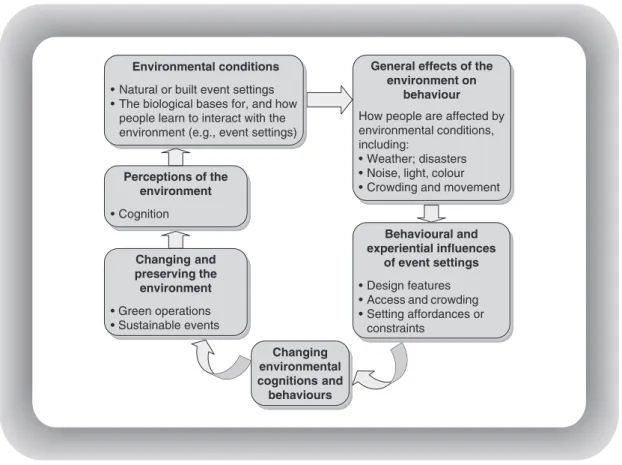
Environmental Preferences
The Behaviour Setting
Self-Determination Theory
Social Cognition and Social Cognitive Theory
In contrast, a person with high effectiveness will attribute failure to external factors, while a person with low self-efficacy will attribute failure to low ability. People with high self-efficacy generally believe they are in control of their own lives, while people with low self-efficacy see their lives shaped by others or by fate.
Theory of Planned Behaviour
Intentions are a function of an individual's (a) attitude toward the behavior, (b) subjective norms, and (c) perceived behavioral control. Subjective norms" are an individual's perception of what others will think, such as whether their peers will approve of the behavior (eg, "all my friends think X's concert will be the best, and I want them to accept me").
Expectation Confirmation Theory
The theory states that a person's intention to do something is the most immediate determinant of behavior. Attitude' towards the behavior is defined as the person's feelings about the behavior (positive or negative) and this derives from beliefs about the possible consequences of the behavior and the desirability of these influences (e.g. 'I think rock concerts' are cool places to meet and being with friends and that's top priority for me').
Social Exchange Theory
The 'behavioural environment' of planned events requires careful attention to how people interact with each other and the environment. Social cognition, including self-efficacy theory, provides a basis for understanding leisure motivation and how people make leisure choices.
Part Two
Philosophers use reasoning, not empirical research, to theorize about the meaning of life and all human belief systems. People who conceive of the meaning of life generally fall into two categories: those who assume religious or spiritual meanings, and those who look elsewhere, within their own minds and value sets.
The Nature of Experience (Phenomenology and Hermeneutics)
All written and symbolic communication (including performances and sports) can be thought of as "text", and that text can be interpreted. Did the researcher find the truth (if there is one) and what does the analysis say about the researcher?
Aesthetics
Although overlap is a feature of the map, 'attributes' included constructs such as 'club activities' and 'volunteering'; 'Consequences' included the constructs of 'exploration and learning', friendship/bonding' and 'a cheer club', and 'end values' included the constructs of 'increased self-esteem' and 'satisfied/fulfilled'. Students may ask, however, whether "legal" is the same as "ethical" and whether the various professional codes of conduct govern us completely and without question.
A Philosophy of Planned Events?
He said (p. 16): 'The proximity and interplay of sacred space/time in any religious activity or ritual is the prerequisite for obtaining the sense of divinity that results in the offering of mystical power.' Using field, participatory surveys. observation, literary support, phenomenology and symbology, Singh examined the growth and spatial patterns of events and their religious significance, both with a view to further understanding the connections between events and religion and to provide recommendations for management improvements. Macroeconomics • Experience • Economic • Event • Measurement • Economic (or 'political and meanings incentives and economic trends of business and the economy'): consumption barriers to the model and influences of the operating forces of • Perceived value of economic consumption and (competition , entire economic for money, as or participation feasibility externalities globalization) systems it shapes • Supply factors • Forecasting • Costs and.
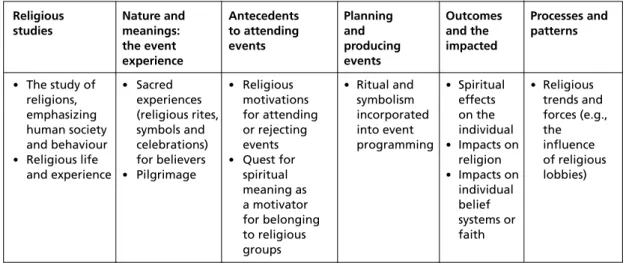
Macro- and Microeconomics
If profit is not the goal, a different set of inputs may be justified, and indeed if a loss can be incurred (due to subsidies or debt forgiveness), the producers can afford to be rather indifferent in their use of resources. The necessary allocation of resources to achieve each objective can be measured, then linked to its priority or 'weight', and from that analysis an optimal strategy can be determined that gives the company or agency the best 'return' on its investment.
Demand’ for Goods and Services
In terms of supply and demand, there are two related 'elasticity' functions to consider. In a free market, supply and demand should eventually reach 'equilibrium', where no more events are produced than can be justified by what consumers are willing to spend.
Economic Demand for Events
We know that as countries develop a middle class with rising incomes, more and more is spent on leisure and travel (in fact there was high 'latent demand' for these goods). In general, people spend more on leisure and travel as their disposable income increases, and businesses and governments also 'demand' more events as their profits or revenues increase.
Willingness to Pay
This happens because the event is the reason for their trip and they will probably only attend once. Residents have plenty of opportunities to attend (or go to other local events) and may want to attend more than once, so they are less willing to pay higher prices per visit.
Direct and Induced Demand
Events and Economic Development
Mega-events in particular fit this approach because they are bold, globally communicated symbols of development. Alternative development' focuses on human needs and the human consequences of development, including consideration of gender equality, indigenous rights, physical, mental and social issues and on sustainable development.
Justifying Market Intervention, or the Subsidizing of Events
If events of any kind are considered a 'public good', free market forces cannot be allowed to operate. Because of the free rider problem, a public good is not profitable to provide by a private firm.
Economic Impacts of Events
However, they should be included in a comprehensive assessment of the costs and benefits of the event. However, it is one of the essential foundations of Event Studies and, unlike other closely related professional fields, which all have core phenomena, management applies to every field of human endeavour.
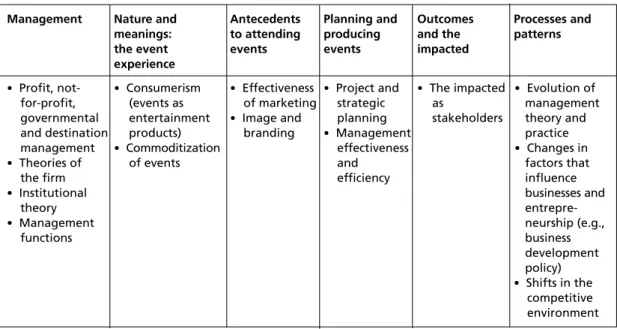
Business Management
Some would argue that management is a field of study, not a discipline, because it is really the application of knowledge from a variety of disciplines.
Resource-Based Theory of the Firm
Knowledge-Based Theory of the Firm
Stakeholder and Network Theory
To sustain itself in the long run, the organization must effectively manage its relationships with stakeholders, and if successful it can become a permanent "institution" in its community. Social capital in this sense means the network of people and organizations that you can rely on to help you.
Resource Dependency Theory
For example, events form professional associations which may be called alliances, but generally do not give up any independence to do so. Long (2000), for example, studied the collaboration between tourism and the arts developed for the UK Year of the Visual Arts.
Competitive and Comparative Advantages
Agency Theory
This theory has been used together with stakeholder theory by Getz et al. 2007) to help explain the failure and institutionalization of events. It relates to organizational culture and the role of founders and leaders (do they always get their way?) Processes of professionalization, bureaucratization, and institutionalization may well increase agency problems as more and more managers become involved and perhaps begin to feel the event exists for their personal or collective benefits.
Population Ecology Theory
New opportunity organizations will therefore often find it difficult to get enough resources and learn how to survive. What if all the resources that were committed are wasted when an event fails.
Public Administration
Institutionalization theory' will provide us with some additional insights into this complex issue, particularly by forcing policymakers and other key actors to think about the important societal goals that events serve and the reasons for providing resources and support to particular organizations. .
Not-for-Profit Management
Non-profit' is a more accurate term than 'non-profit' to describe them, as they can make (and should strive to) surplus income, but must use it to maintain and improve the organization and their events.
Destination Management
Institutional Theory and ‘Institutionalization’
Political attitudes and 'voting patterns': Political scientists often study elections and underlying voter attitudes and behaviour, including how political campaigns and specific messages influence the voter. The study of • Events can • Political • Create •Effects on •How politics governments, take on motives for events such as politics, and policies public policies political participate or political government, influence and political significance stay away declaration political event behavior • Participation ( e.g. protest, parties and development .. can be a party loyalty, law and . political nationalism) participation.
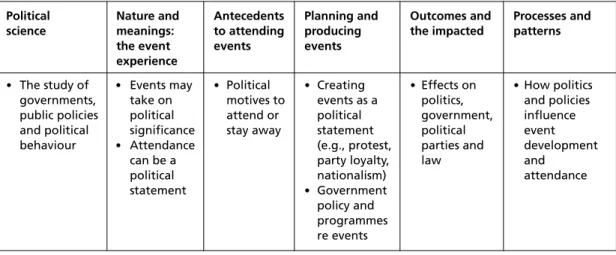
Research on the Political Science of Events
Is there any point in opposing a government's policy on events, such as whether to provide subsidies or tax breaks, if that policy actually reflects the country's dominant value system. Law Nature and antecedents Planning outcomes Processes meanings: participating in and and the events that produce affected patterns.
Justice
Legal Considerations Influencing Demand, Experiences and Meanings
Politics is one of the main topics in event studies, and it happens with a political environment. Describe several theories of the firm and show their application to private, nonprofit, and public sector events.
Part Three
In this chapter, the two fundamental disciplines of history and geography, which represent the temporal and spatial dimensions, are discussed in depth. Event studies require an understanding of history and a consideration of the future, and this cannot be separated from the spatial dimension.
Historiography
The other two dynamic processes that form Event Studies are considered in separate chapters, namely policy and knowledge creation. In this sense we can speak of both the history of planned events and the historiography of writing about event history.
History through the Lens of Planned Events
Of course statements like this, from the Herald (p. 18), represent self-image and not a fair assessment of true world opinion. A history of the world (or any corner or aspect of it) must include great planned and spontaneous events.
Events and Ordinary Life
Events and Society
And there is a diversity and creativity to planned events that signify invention, rebirth, exploration and other great triumphs of the human spirit. In some parts of the world, such as China, Western holidays and celebrations, including Christmas and Halloween, are just beginning.
Events and the Economy
Imitation is widespread, but there are also fundamental social and cultural reasons for the spread or death of any kind of special event.
The History of Events, and Their Life Cycle
The development and 'life cycle' of events is an important historical topic with managerial implications. Stages in the life cycle are not always clear, but events have a birth, they grow and mature, and many die or require rejuvenation.
A History of Event Producers and Managers
Sofield and Sivan (2003) showed how Hong Kong's famous dragon boat races had shifted from culture to sport tourism in their orientation, with tourism helping to preserve the tradition. See Jarvie (1991) on the Highland Games for an account of the history of a category of event in its cultural context.
The Greatest Parade Ever?
Daniel Boorstin, ‘Pseudo-events’, and the Authenticity Debate
Historical Geography studies geographic patterns over time, such as the evolving distribution of events in a region. Economic Geography is the study of the location, distribution and spatial organization of economic activities.
Spatial and Temporal Patterns of Events
But the pattern of events in the landscape has changed dramatically in response to powerful forces. Wicks and Fesenmaier (1995) found that summer was the most popular for travel to events in the American Midwest, with fall being the next most popular.
Event Tourism: The Geographical Perspective
His 1991 paper looked more carefully at the history of festivals in the state, including when they were established and their spatial distribution over time. In a 1996 paper, Janiskee examined the monthly and seasonal patterns of community festivals in the United States, making it clear that their numbers are relatively low in winter, late fall, and early spring.
Event Attractiveness
Analysis of the zones of influence of events was undertaken by Teigland (1996) specifically for the Olympic Winter Games in Lillehammer (Norway), and this method has implications for event planning, especially in relation to mega-events with multiple venues. The elements of these zones of influence are the gates, venue locations, tourist flow, transport management and displacement of other activities.
Time Switching and Displacement
One possibility is to group arrangements in service centers as opposed to spreading them over a large land area. The spatial distribution of costs and benefits is of particular interest in event geography, as are issues of social equity.
Event Places
Human fascination with the future is at least equal to our curiosity about the past. It is an interdisciplinary approach to gaining an understanding of how today's conditions and trends are likely to shape the future (in part it is therefore impact forecasting), and how future conditions may be shaped by policies and actions taken (or not taken) today ) – as in how we need to reduce greenhouse emissions to avoid the worst effects of global warming.
The Future is a Social Construct
We incorporate the future into our daily lives when we say things like: "this is a good investment" (ie I'll be richer in a few years) or "I'll wait for the price to go down". technological innovations are always expensive at first, but then consumers notice that prices are falling rapidly). Jason Ensor argued that we should think about the future in ways that are critical and lead to more choices, rather than being limited by current ideology or narrow thinking.
Trend Analysis and Extrapolation
Because technological progress is so rapid and most innovations are already predicted (or pre-sold through exhibitions and TV shows), we are no longer surprised by the next innovation – we are only surprised that it is not yet cheap to buy. Megatrends span many generations and consist of complex interactions between many factors (eg major social trends such as the growth and globalization of event tourism).
Scenario Making
Branching Trends: Once a megatrend is identified, many branching or interrelated trends can be tracked and evaluated. One can then look at trends in the market segments for each type of event, such as gender based, linked to levels of engagement, or their destination choices.
Delphi
Someone has to identify them in the early stages and they might be wrong. Its use in the events sector has been limited, but Carlsen, Getz and Soutar (2001) used Delphi to examine the practice and needs of event evaluation, while Weber and Ladkin (2004) used a panel of experts to identify and assess trends that influence the convention industry.
Global Challenges for the Events Sector
If we consider the geographical approach, the seasonality of events and their distribution in time and space is firstly obvious. Place identity refers to the association of events with places and the meaning that communities attach to events.
Closely Related
Professional Fields
There are a number of closely related professional fields that involve events, contribute to, and benefit from event studies. Professional fields tend to develop along similar lines, generally beginning with professional practice and eventually developing related academic programs, their own lines of research, and a degree of interdisciplinary theory and methodology.
Parks and Recreation Management
Parks • Communication • Parks are • Planning for • Impacts have • Shifting management with natural attractions events as a demand and. Therapeutic experiences of public events. special needs) • Well-being • The facility as recreation recreation and health an attraction.
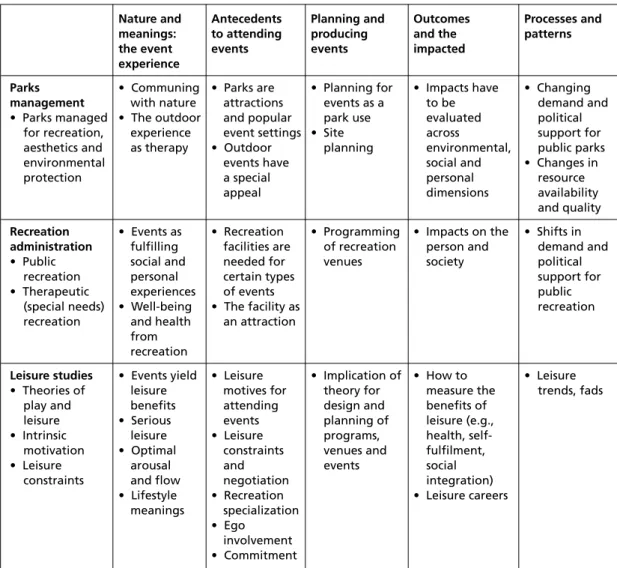
Leisure Studies
Shaw and Williams (2004) discussed new forms of tourism consumption, which is very relevant to event studies. Informality and spontaneity also characterize new forms of tourism consumption (p. 131), as well as "employment and belief in the use of all senses for personal well-being." Technology is increasingly integrated into the consumption process. .
Play Theory
They argued that "post-Fordist" (ie, that which follows mass tourism with an emphasis on standard products) tourists seek "the accumulation of social and cultural capital" (p. 132). Among some lifestyle segments, these trends have resulted in a significant increase in green and cultural tourism.
Leisure Experience
To study leisure experiences, researchers have looked at what people do (the 'behavioural' or 'conative' dimension), moods, emotions and feelings (the 'affective' or evaluative components) and thoughts and images (the 'cognitive' component ). For example, Maslow's (1968) idea of the 'peak experience'. moments of supreme happiness and fulfillment') and Csikszentmihalyi's (1975) 'flow'. the best moments of people's lives') take place.
Leisure Over One’s Life (The Life-Stage Approach)
What a person perceives, feels, learns or remembers, in short his or her experience, is often derived from behaviour. A related theory suggests that people always tend to do things spontaneously for fun or distraction.
Leisure Careers and Leisure Socialization
Leisure Benefits and Event Benefits
Need-compensation theory': leisure activities or events may be chosen to compensate for unmet needs in one's life; recreation can compensate for dissatisfaction with work or other social settings. Personal growth': leisure offers people a way to test themselves, develop skills, learn, fulfill their aspirations (the Maslow approach); the more people invest in their recreation, the more they get out of it (serious recreation, involvement, commitment).
Self-Construal
Intrinsically motivated behavior occurs in the absence of any visible external reward and when people have free choice. Motivated behavior is fundamentally based on the innate psychological need for competence, relatedness (love and meaningful social connection), and self-determination.
Leisure Constraints
Ego-Involvement
Sign': unspoken elements that the activity or product consumption conveys about the person (such as the prestige attached to certain events). Centrality' for lifestyle: referring to both social contexts and the role of the activity or product in the person's lifestyle (people who are heavily involved in art will show very different levels of interest in particular art events, and will seek different benefits from their presence).
Recreation Specialization
Attraction': perceived importance or interest in an activity or product, and the pleasure derived from doing or using it (eg running offers certain benefits, but what is the additional pleasure derived form participating in a marathon take?). One pertinent application of ego involvement to event studies has been made by researchers investigating runners.
Commitment and Serious Leisure
For the organizers, this also helped them achieve their goals of raising awareness and improving conservation efforts. An ethos associated with the social world (common interests and mutual communication related to the 'social object' of interest to the group, such as sport, art, wine).
Research Methodologies and Methods in Leisure Studies
Hall's graphic representation of his approach (p. 5), called 'Disciplinary Spaces of Tourism', shows areas and disciplines in an outer ring, a middle ring made up of 'multidisciplinary approaches' and an identified inner zone. as 'interdisciplinary approaches to tourism and the emerging field of tourism. Events can be seen as a subset of this interdependence between leisure and tourism, but neither leisure nor tourism studies are centrally concerned with the planning, design, experience and management of events.
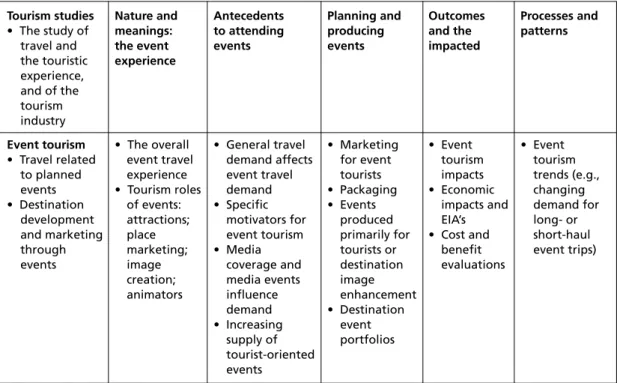
Event Tourism: The Destination Perspective
Leisure and tourism studies clearly overlap when considering tourism as a social phenomenon within leisure activities, and they overlap at the business and managerial levels because there are numerous companies providing leisure/travel experiences.
Events as Attractions
The 'law of the commons' applies here, as a community and its resources can be damaged by too many events, too much event tourism or by poorly managed events. The goal should not be to maximize event tourism volumes, but to develop a manageable and balanced portfolio of events that meet multiple goals and deliver many benefits (see Chapter 12 for details).
Events as Animators
One issue to consider is that cultural and environmental 'resources' are often in the public domain and anyone can 'exploit' them without compensation or consideration of impacts. The events are mostly entertainment and this element, combined with new on-site rides and facilities, is designed to help extend the product's life cycle.
Events and Place Marketing: Co-Branding
Baxter (2001) looked at how water parks used entertainment and special events and found that some of them see it as a way to increase attendance and revenue, while others want to increase consumer awareness among target segments and strengthen branding.
Events as Image-Makers
However, Hudson et al. (2004) in conceptualizing (with a graphical model) the process by which events might influence travel choices, concluded that there were many intervening factors separating perception from travel behavior, and that watching events – especially sporting events – may lead to traveling elsewhere to participate in the sport. Also, the authors concluded that if the destination image dimensions affected by an event are not the dimensions that determine destination choice, then there will be no resulting impact on travel.
Events as Catalysts
However, Hede (2005) concluded that Australians who watched broadcasts of the Athens 2004 Olympic Games did change their overall attitudes towards Greece as a destination. 2006) concluded that the media coverage of events helped change images of Canberra, and they recommended that events should be part of any promotional strategy for national capitals.
The Cultural Event Tourist
Although there are many definitions of cultural tourism in the literature, McKercher and du Cros (2002: 3) stated that it can be approached from four perspectives: 'derivative tourism' (a form of special interest travel; a product); 'motivational' (what travelers are looking for, including visits to the arts, monuments, festivals); 'experiential' (an emphasis on cultural learning; the search for understanding and self-fulfillment) and 'operational' (related to the purpose of the study, as in this case to examine festivals as a form of cultural tourism). McKercher and du Cros' (2002) cultural tourist classification system was used, distinguishing between the 'serendipitous cultural tourist', the 'purposeful', 'sightseeing', 'accidental'.
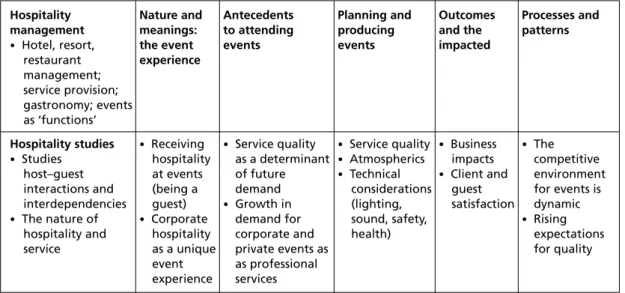
Learning Theory
Analysis is the examination and division of information into parts by identifying motives or causes. Synthesis is the gathering of information in a new way by combining elements into patterns or proposing alternative solutions.
Interpretation
Thematic Interpretation
A theme is a take-home message; it is the moral of the story or the main conclusion a visitor draws. Higher levels of effectiveness can probably be achieved through greater investment in planning and research.
Interpretation Tools
Sam Ham of the University of Idaho is most involved in developing and applying thematic interpretation within parks, heritage and tourism. Xie argued that authenticity was to some extent "existential," that is, in the minds of those present rather than an aspect of the program itself.
Communications Studies
Information theory', at its most basic, is concerned with the communication process between a 'sender' (eg the event or an element of it) and a 'receiver' (a person or a wider audience). Performance • Events as • Desire for • Actors and • Personal and • Values and studies expressions alternative audience group identities attitudes.
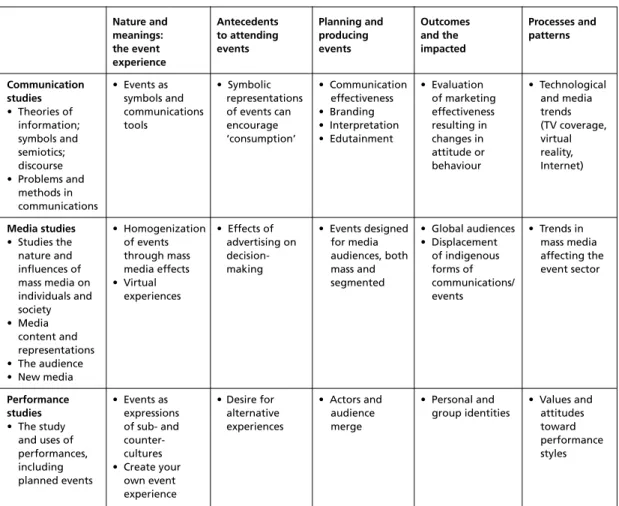
Discourse
Media Studies
Performance Studies
Finally, if the audience does not get into a festive event, if it lacks involvement, the organizers are likely to be blamed. In the "festive frame" the organizers should involve the audience and some spontaneity should result.
Performance (or ‘live’) Art
If the audience feels cheated in some way, for example, the performance was completely different from what was advertised, the quality of the performance becomes quite irrelevant to them. In exciting events (races) the audience may conclude that the risks were minimal or rigged.
Installation Art
Sport • Sport is both • Unique • Sports venue • Sports tourism • Sports trends, management big business motives for managers influences of fads (e.g. Sport as sports tourism clubs in the politics of sports events Sports studies social • Offer for sports events • History of sports.
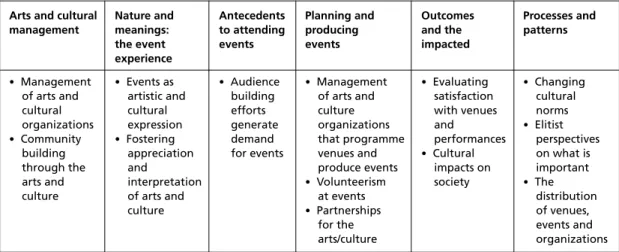
Sport Studies
Design and • Club • Some venues • Venues • Private • Membership in venue management are attractions produce compared to public event technologies creates in own and host access to and setting design expectations of real event venues and • Popularity. The [theatre studies] program offers hands-on courses in acting, speech and voice, movement, children's theater and stage production, as well as courses in theater history, dramatic theory and criticism, film, Canadian film and drama, and women in theatre.
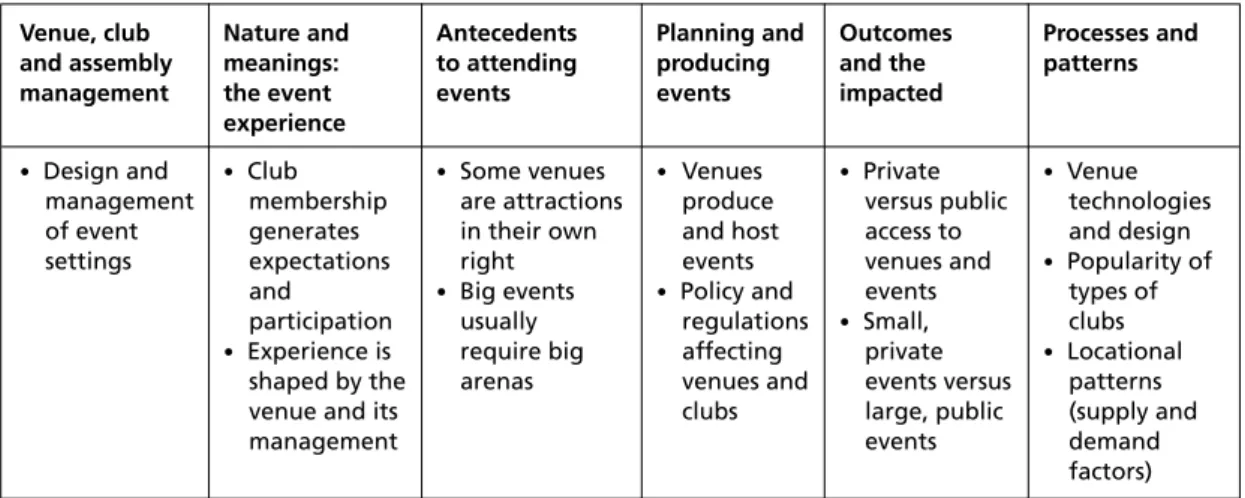
Scripting Events
An interaction must occur, but the 'audience' does not necessarily appreciate that they are part of a performance or influenced by a script. Many events are particularly part of cultural tourism, while equal attention should be paid to sports, business and other travel markets.

The Event Experience and Meanings
This chapter deals with the core phenomenon of Event Studies - planned event experiences - and meanings attached to them. Our starting point is a definitional discussion, noting different meanings of 'experience' and how it can be used as both a noun and a verb.
Experience’ Defined Generically
Referring back to these examples, note that the 'conative' dimension of experience describes actual behaviour, the things people do including physical activity. The 'cognitive' dimension of experience refers to awareness, perception, memory, learning, judgment and understanding or making sense of the experience.
Leisure Experience’ (Intrinsic Motivation and Freedom of Choice)
The ‘Experience Economy’
Education, for Pine and Gilmore (and many educators), should be interactive, with the onus on the learner to engage and on the educator to facilitate it. According to Pine and Gilmore (p. 33) escapist experiences require much greater immersion than educational or entertainment experiences.
Pine and Gilmore on Designing Experiences
Surprise is a major element in the Pine and Gilmore approach, which means staging the unexpected (p. 96). Taking the theatrical analogy further, Pine and Gilmore discussed the various roles and actors required for a theatrical production, all of which are directly relevant in the events industry.
Tourism Experiences
